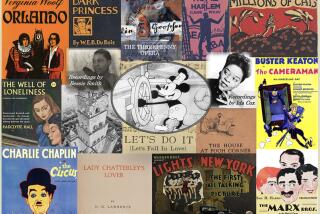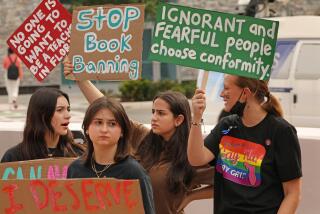Exceptions Sought to Copyright Rules
- Share via
WASHINGTON — A handful of library organizations, universities and digital-rights groups plan to ask the U.S. Copyright Office today for permission to bypass a controversial copy-protection law, but few hold out hope that the agency will grant their request.
The American Library Assn., the Assn. of American Universities and the Electronic Frontier Foundation are among those groups planning to file formal requests with the Copyright Office, the agency responsible for carving out exceptions to the Digital Millennium Copyright Act, a 1998 law that made it illegal to circumvent digital copy-protection devices.
The deadline to submit requests is today.
Renewing many of the same concerns they raised three years ago, the groups will argue that they need permission to bypass copy-protection devices to make legally permissible copies of scholarly articles, to archive materials for safekeeping and historical purposes, and to make digital products such as DVDs able to operate on different kinds of platforms. If that exception is not granted, the groups say they face considerable expense buying additional copies, or must do without.
But representatives from several groups complained that the Copyright Office has set such a high standard for making exceptions to the law that it was unlikely that any of their requests would be granted. In fact, some groups were so discouraged that they are not bothering to participate in the DMCA proceeding or are investing less time and money.
“A lot of people feel, ‘What’s the point? Why bother,’ ” said Miriam Nisbet, a lobbyist for the American Library Assn. “They fear the process is still stacked against them and there’s not much hope for change. The standard is too high.”
The review occurs every three years. After the last review, the agency granted only two, narrowly crafted exemptions, one for Web-filtering software, the other for malfunctioning or obsolete products.
David Carson, general counsel for the Copyright Office, said the standards for the review were set by lawmakers.
“The process is dictated by the law Congress passed,” Carson said.
But critics say the Copyright Office, which frequently sides with authors and content providers, went too far in requiring that those seeking an exemption prove that the anti-circumvention law is causing actual harm.
“Our job is to show damage,” said John Vaughn, executive vice president of the Assn. of American Universities. “We haven’t been able to do that, in part because we can’t afford to let the damage happen.”
In an interview earlier this year, Copyright Register Marybeth Peters took issue with the contention that publishers and entertainment companies would use the DMCA to lock up content. “So far, from what we’ve learned, the fears that were expressed have not become reality. That’s music to my ears,” Peters said.






